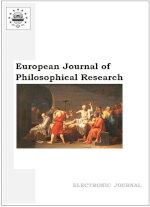1 December 25, 2022
Articles
1. Andrii E. Lebid, Borys Pugach, Tetiana Tymofieieva
Heuristic Benchmarks for Accurate Scientific Knowledge
European Journal of Philosophical Research. 2022. 9(1): 3-17.
Number of views: 116 Download in PDF
2. Marianna NapolitanoEuropean Journal of Philosophical Research. 2022. 9(1): 3-17.
Abstract:
Based on the laws of scientific development characteristics of modern scientific knowledge have been identified — the trend for the full, deep, genuine, reliable and adequate knowledge. The essence of imperatives in philosophy has been found. Its main requirement is that the fundamental physical parameters shall be measurable. It was stated that the concepts of measurable and non-measurable, observable and non-observable, theoretical and experimental are the key elements of the above requirement. The role of mathematics in forming accurate knowledge was specified; the following factors of this knowledge were discovered: increase in the knowledge accuracy and cognitive means of research, expression of cognitive findings in physically measurable values. The main properties of knowledge accuracy were justified and the factors of its growth were found out.
Based on the laws of scientific development characteristics of modern scientific knowledge have been identified — the trend for the full, deep, genuine, reliable and adequate knowledge. The essence of imperatives in philosophy has been found. Its main requirement is that the fundamental physical parameters shall be measurable. It was stated that the concepts of measurable and non-measurable, observable and non-observable, theoretical and experimental are the key elements of the above requirement. The role of mathematics in forming accurate knowledge was specified; the following factors of this knowledge were discovered: increase in the knowledge accuracy and cognitive means of research, expression of cognitive findings in physically measurable values. The main properties of knowledge accuracy were justified and the factors of its growth were found out.
Number of views: 116 Download in PDF
The Concept of Monarchy and the Role of Orthodoxy in Ivan Solonevich’s Philosophy
European Journal of Philosophical Research. 2022. 9(1): 18-36.
Number of views: 119 Download in PDF
3. European Journal of Philosophical Research. 2022. 9(1): 18-36.
Abstract:
Ivan Lukyanovich Solonevich (1891−1963) entered the history of Russian socio-political thought as a theorist of monarchism. Solonevich believed that the decisive factor in state-building is people’soul. In his opinion, the people's monarchy (as opposed to the monarchy of the upper class) is Russia’s ideal state structure. It existed before the reforms of Peter I and was characterized by a combination of autocracy and self-government. After its overthrow by the Bolsheviks it should become the most effective form of government in Russia. The concept of “sobornaya monarchiya” proposed by Solonevich meant “an absolutely concrete historical phenomenon, tested by the experience of centuries and giving truly brilliant results [...]” (Solonevich, Narodnaya Monarchiya, 2010). Solonevich's reasoning in The People's Monarchy is an important source of inspiration for modern monarchists. The purpose of this article is to trace the historical and ideological origins of Solonevich's thought and to show that it may help to better understand the recent convergence of Russian state and church’s views on the question of identity and of the Orthodox civilization’s value. In fact, in order to understand Solonevich's philosophy and its usefulness in grasping contemporary Russian reality, it is important to reflect on the meaning of the uniqueness of Russia and of Russian history, on the monarchy and empire’s role, and on the concept of supra-idea. Since the collapse of the Soviet Union there have been discussions about how to fill the ideological void left by communism and how to formulate a new “Russian idea”. In this discussion, Orthodoxy and Russian Orthodox Church’s roles have been very important, because the Orthodox world was presented not only as a church and cultural project, but also as a political project, the basis of which laid precisely in the need to overcome political institutions’ crisis of legitimization followed to the end of communism.
Ivan Lukyanovich Solonevich (1891−1963) entered the history of Russian socio-political thought as a theorist of monarchism. Solonevich believed that the decisive factor in state-building is people’soul. In his opinion, the people's monarchy (as opposed to the monarchy of the upper class) is Russia’s ideal state structure. It existed before the reforms of Peter I and was characterized by a combination of autocracy and self-government. After its overthrow by the Bolsheviks it should become the most effective form of government in Russia. The concept of “sobornaya monarchiya” proposed by Solonevich meant “an absolutely concrete historical phenomenon, tested by the experience of centuries and giving truly brilliant results [...]” (Solonevich, Narodnaya Monarchiya, 2010). Solonevich's reasoning in The People's Monarchy is an important source of inspiration for modern monarchists. The purpose of this article is to trace the historical and ideological origins of Solonevich's thought and to show that it may help to better understand the recent convergence of Russian state and church’s views on the question of identity and of the Orthodox civilization’s value. In fact, in order to understand Solonevich's philosophy and its usefulness in grasping contemporary Russian reality, it is important to reflect on the meaning of the uniqueness of Russia and of Russian history, on the monarchy and empire’s role, and on the concept of supra-idea. Since the collapse of the Soviet Union there have been discussions about how to fill the ideological void left by communism and how to formulate a new “Russian idea”. In this discussion, Orthodoxy and Russian Orthodox Church’s roles have been very important, because the Orthodox world was presented not only as a church and cultural project, but also as a political project, the basis of which laid precisely in the need to overcome political institutions’ crisis of legitimization followed to the end of communism.
Number of views: 119 Download in PDF







